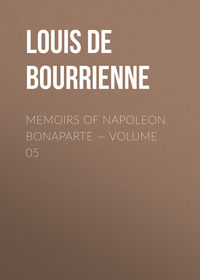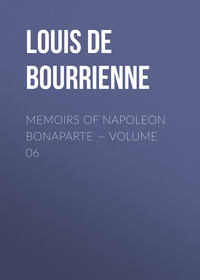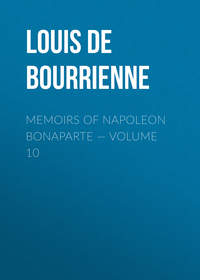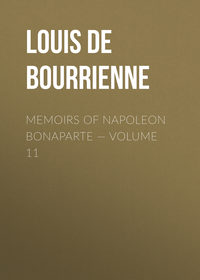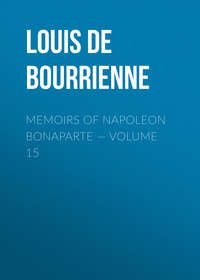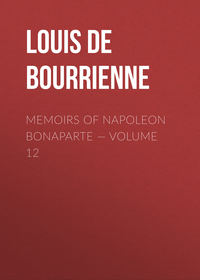 полная версия
полная версияMemoirs of Napoleon Bonaparte — Volume 08
The recollection of those arbitrary and vexatious proceedings on the part of Bonaparte has led me farther than I intended. I shall therefore return to the imperial residence of St. Cloud. On leaving the audience- chamber, as already stated, I repaired to the apartments of the Empress, who, knowing that I was in the Palace, had intimated her wishes for my attendance. No command could have been more agreeable to me, for every one was certain of a gracious reception from Josephine. I do not recollect which of the ladies in waiting was in attendance when my name was announced; but she immediately retired, and left me alone with Josephine. Her recent elevation had not changed the usual amenity of her disposition. After some conversation respecting the change in her situation, I gave her an account of what had passed between the Emperor and myself.
I faithfully related all that he had said of Moreau, observing that at one moment I imagined he was about to speak of the Due d'Enghien, when he suddenly reverted to what he had been saying, and never made the slightest allusion to the subject.
Madame Bonaparte replied to me, "Napoleon has spoken the truth respecting Moreau. He was grossly deceived by those who believed they could best pay their court to him by calumniating that general. His silence on the subject of the Due d'Enghien does not surprise me; he says as little respecting it as possible, and always in a vague manner, and with manifest repugnance. When you see Bonaparte again be silent on the subject, and should chance bring it forward, avoid every expression in the smallest degree indicative of reproach; he would not suffer it; you would ruin yourself for ever in his estimation, and the evil is, alas! without remedy. When you came to Malmaison I told you that I had vainly endeavoured to turn him from his fatal purpose, and how he had treated me. Since then he has experienced but little internal satisfaction; it is only in the presence of his courtiers that he affects a calm and tranquil deportment; but I perceive his sufferings are the greater from thus endeavouring to conceal them. By the by, I forgot to mention that he knew of the visit you paid me on the day after the catastrophe. I dreaded that your enemies, the greater number of whom are also mine, might have misrepresented that interview; but, fortunately, he paid little attention to it. He merely said, 'So you have seen Bourrienne? Does he sulk at me? Nevertheless I must do something for him.' He has again spoken in the same strain, and repeated nearly the same expressions three days ago; and since he has commanded your presence to-day, I have not a doubt but he has something in view for your advantage."—" May I presume to inquire what it is?"—"I do not yet know; but I would recommend to you, in the meantime, to be more strictly on your guard than ever; he is so suspicious, and so well informed of all that is done or said respecting himself. I have suffered so much since I last saw you; never can I forget the unkind manner in which he rejected my entreaties! For several days I laboured under a depression of spirits which greatly irritated him, because he clearly saw whence it proceeded. I am not dazzled by the title of Empress; I dread some evil will result from this step to him, to my children, and to myself. The miscreants ought to be satisfied; see to what they have driven us! This death embitters every moment of my life. I need not say to you, Bourrienne, that I speak this in confidence."—"You cannot doubt my prudence."—" No, certainly not, Bourrienne. I do not doubt it. My confidence in you is unbounded. Rest assured that I shall never forget what you have done for me, under various circumstances, and the devotedness you evinced to me on your return from Egypt.—Adieu, my friend. Let me see you soon again."
It was on the 14th of June 1804 that I had this audience of the Emperor, and afterwards attended the Empress.
On my return home I spent three hours in making notes of all that was said to me by these two personages; and the substance of these notes I have now given to the reader.
CHAPTER XXVIII
1804.
Curious disclosures of Fouche—Remarkable words of Bonaparte respecting the protest of Louis XVIII—Secret document inserted in the Moniteur—Announcement from Bonaparte to Regnier—Fouche appointed Minister of Police—Error of Regnier respecting the conspiracy of Georges—Undeserved praise bestowed on Fouche— Indication of the return of the Bourbons—Variation between the words and conduct of Bonaparte—The iron crown—Celebration of the 14th of July—Church festivals and loss of time—Grand ceremonial at the Invalides—Recollections of the 18th Brumaire—New oath of the Legion of Honour—General enthusiasm—Departure for Boulogne—Visits to Josephine at St. Cloud and Malmaison—Josephine and Madame de Remusat—Pardons granted by the Emperor—Anniversary of the 14th of July—Departure for the camp of Boulogne—General error respecting Napoleon's designs—Caesar's Tower—Distribution of the crosses of the Legion of Honour—The military throne—Bonaparte's charlatanism —Intrepidity of two English sailors—The decennial prizes and the Polytechnic School—Meeting of the Emperor and Empress—First negotiation with the Holy Sea—The Prefect of Arras and Comte Louis de Narbonne—Change in the French Ministry.
Louis XVIII., being at Warsaw when he was informed of the elevation of Napoleon to the Imperial dignity, addressed to the sovereigns of Europe a protest against that usurpation of his throne. Fouche, being the first who heard of this protest, immediately communicated the circumstance to the Emperor, observing that doubtless the copies would be multiplied and distributed amongst the enemies of his Government, in the Faubourg St. Germain, which might produce the worst effects, and that he therefore deemed it his duty to inform him that orders might be given to Regnier and Real to keep a strict watch over those engaged in distributing this document.
"You may judge of my surprise," added Fouche, "you who know so well that formerly the very mention of the Bourbons rendered Bonaparte furious, when, after perusing the protest, he returned it to me, saying, 'Ah, ah, so the Comte de Lille makes his protest! Well, well, all in good time. I hold my right by the voice of the French nation, and while I wear a sword I will maintain it! The Bourbons ought to know that I do not fear them; let them, therefore, leave me in tranquillity. Did you say that the fools of the Faubourg St. Germain would multiply the copies of this protest of Comte de Lille? well, they shall read it at their ease. Send it to the Moniteur, Fouche; and let it be inserted to-morrow morning.'" This passed on the 30th of June, and the next day the protest of Louis XVIII. did actually appear in that paper.
Fouche was wholly indifferent respecting the circulation of this protest; he merely wished to show the Emperor that he was better informed of passing events than Regnier, and to afford Napoleon another proof of the inexperience and inability of the Grand Judge in police; and Fouche was not long in receiving the reward which he expected from this step. In fact, ten days after the publication of the protest, the Emperor announced to Regnier the re-establishment of the Ministry of General Police.
The formula, I Pray God to have you in His holy keeping, with which the letter to Regnier closed, was another step of Napoleon in the knowledge of ancient usages, with which he was not sufficiently familiar when he wrote Cambaceres on the day succeeding his elevation to the Imperial throne; at the same time it must be confessed that this formula assorted awkwardly with the month of "Messidor," and the "twelfth year of the Republic!"
The errors which Regnier had committed in the affair of Georges were the cause which determined Bonaparte to re-establish the Ministry of Police, and to bestow it on a man who had created a belief in the necessity of that measure, by a monstrous accumulation of plots and intrigues. I am also certain that the Emperor was swayed by the probability of a war breaking out, which would force him to leave France; and that he considered Fouche as the most proper person to maintain the public tranquillity during his absence, and detect any cabala that might be formed in favour of the Bourbons.
At this period, when Bonaparte had given the finishing blow to the Republic, which had only been a shadow since the 19th Brumaire, it was not difficult to foresee that the Bourbons would one day remount the throne of their ancestors; and this presentiment was not, perhaps, without its influence in rendering the majority greater in favour of the foundation of the Empire than for the establishment of a Consulate for life. The reestablishment of the throne was a most important step in favour of the Bourbons, for that was the thing most difficult to be done. But Bonaparte undertook the task; and, as if by the aid of a magic rod, the ancient order of things was restored in the twinkling of an eye. The distinctions of rank—orders—titles, the noblesse—decorations—all the baubles of vanity—in short, all the burlesque tattooing which the vulgar regard as an indispensable attribute of royalty, reappeared in an instant. The question no longer regarded the form of government, but the individual who should be placed at its head. By restoring the ancient order of things, the Republicans had themselves decided the question, and it could no longer be doubted that when an occasion presented itself the majority of the nation would prefer the ancient royal family, to whom France owed her civilisation, her greatness, and her power, and who had exalted her to such a high degree of glory and prosperity.
It was not one of the least singular traits in Napoleon's character that during the first year of his reign he retained the fete of the 14th of July. It was not indeed strictly a Republican fate, but it recalled the recollection of two great popular triumphs,—the taking of the Bastille and the first Federation. This year the 14th of July fell on a Saturday, and the Emperor ordered its celebration to be delayed till the following day, because it was Sunday; which was in conformity with the sentiments he delivered respecting the Concordat. "What renders me," he said, "most hostile to the re-establishment of the Catholic worship is the number of festivals formerly observed. A saint's day is a day of indolence, and I wish not for that; the people must labour in order to live. I consent to four holidays in the year, but no more; if the gentlemen from Rome are not satisfied with this, they may take their departure."
The loss of time seemed to him so great a calamity that he seldom failed to order an indispensable solemnity to be held on the succeeding holiday. Thus he postponed the Corpus Christi to the following Sunday.
On Sunday, the 15th of July 1804, the Emperor appeared for the first time before the Parisians surrounded by all the pomp of royalty. The members of the Legion of Honour, then in Paris, took the oath prescribed by the new Constitution, and on this occasion the Emperor and Empress appeared attended for the first time by a separate and numerous retinue.
The carriages in the train of the Empress crossed the garden of the Tuileries, hitherto exclusively appropriated to the public; then followed the cavalcade of the Emperor, who appeared on horseback, surrounded by his principal generals, whom he had created Marshals of the Empire. M. de Segur, who held the office of Grand Master of Ceremonies, had the direction of the ceremonial to be observed on this occasion, and with, the Governor received the Emperor on the threshold of the Hotel des Invalides. They conducted the Empress to a tribune prepared for her reception, opposite the Imperial throne which Napoleon alone occupied, to the right of the altar. I was present at this ceremony, notwithstanding the repugnance I have to such brilliant exhibitions; but as Duroc had two days before presented me with tickets, I deemed it prudent to attend on the occasion, lest the keen eye of Bonaparte should have remarked my absence if Duroc had acted by his order.
I spent about an hour contemplating the proud and sometimes almost ludicrous demeanour of the new grandees of the Empire; I marked the manoeuvring of the clergy, who, with Cardinal Belloy at their head, proceeded to receive the Emperor on his entrance into the church. What a singular train of ideas was called up to my mind when I beheld my former comrade at the school of Brienne seated upon an elevated throne, surrounded by his brilliant staff, the great dignitaries of his Empire— his Ministers and Marshals! I involuntarily recurred to the 19th Brumaire, and all this splendid scene vanished; when I thought of Bonaparte stammering to such a degree that I was obliged to pull the skirt of his coat to induce him to withdraw.
It was neither a feeling of animosity nor of jealousy which called up such reflections; at no period of our career would I have exchanged my situation for his; but whoever can reflect, whoever has witnessed the unexpected elevation of a former equal, may perhaps be able to conceive the strange thoughts that assailed my mind, for the first time, on this occasion.
When the religious part of the ceremony terminated, the church assumed, in some measure, the appearance of a profane temple. The congregation displayed more devotion to the Emperor than towards the God of the Christians,—more enthusiasm than fervour. The mass had been heard with little attention; but when M. de Lacepede, Grand Chancellor of the Legion of Honour, after pronouncing a flattering discourse, finished the call of the Grand Officers of the Legion, Bonaparte covered, as did the ancient kings of France when they held a bed of justice. A profound silence, a sort of religious awe, then reigned throughout the assembly, and Napoleon, who did not now stammer as in the Council of the Five Hundred, said in a firm voice:
"Commanders, officers, legionaries, citizens, soldiers; swear upon your honour to devote yourselves to the service of the Empire—to the preservation of the integrity of the French territory—to the defence of the Emperor, of the laws of the Republic, and of the property which they have made sacred—to combat by all the means which justice, reason, and the laws authorise every attempt to reestablish the feudal system; in short, swear to concur with all your might in maintaining liberty and equality, which are the bases of all our institutions. Do you swear?"
Each member of the Legion of Honour exclaimed, "I swear;" adding, "Vive l'Empereur!" with an enthusiam it is impossible to describe, and in which all present joined.
What, after all, was this new oath? It only differed from that taken by the Legion of Honour, under the Consulate, in putting the defence of the Emperor before that of the laws of the Republic; and this was not merely a form. It was, besides, sufficiently laughable and somewhat audacious, to make them swear to support equality at the moment so many titles and monarchical distinctions had been re-established.
On the 18th of July, three days after this ceremony, the Emperor left Paris to visit the camp at Boulogne. He was not accompanied by the Empress on this journey, which was merely to examine the progress of the military operations. Availing myself of the invitation Josephine had given me, I presented myself at St. Cloud a few days after the departure of Napoleon; as she did not expect my visit, I found her surrounded by four or five of the ladies in waiting, occupied in examining some of the elegant productions of the famous Leroi and Madame Despeaux; for amidst the host of painful feelings experienced by Josephine she was too much of a woman not to devote some attention to the toilet.
On my introduction they were discussing the serious question of the costume to be worn by the Empress on her journey to Belgium to meet Napoleon at the Palace of Lacken, near Brussels. Notwithstanding those discussions respecting the form of hats, the colour and shape of dresses, etc., Josephine received me in her usual gracious manner. But not being able to converse with me, she said, without giving it an appearance of invitation but in a manner sufficiently evident to be understood, that she intended to pass the following morning at Malmaison.
I shortened my visit, and at noon next day repaired to that delightful abode, which always created in my mind deep emotion. Not an alley, not a grove but teemed with interesting recollections; all recalled to me the period when I was the confidant of Bonaparte. But the time was past when he minutely calculated how much a residence at Malmaison would cost, and concluded by saying that an income of 30,000 livrea would be necessary.
When I arrived Madame Bonaparte was in the garden with Madame de Remusat, who was her favourite from the similarity of disposition which existed between them.
Madame de Remusat was the daughter of the Minister Vergennes, and sister to Madame de Nansouty, whom I had sometimes seen with Josephine, but not so frequently as her elder sister. I found the ladies in the avenue which leads to Ruel, and saluted Josephine by inquiring respecting the health of Her Majesty. Never can I forget the tone in which she replied: "Ah! Bourrienne, I entreat that you will suffer me, at least here, to forget that I am an Empress." As she had not a thought concealed from Madame de Remusat except some domestic vexations, of which probably I was the only confidant, we conversed with the same freedom as if alone, and it is easy to define that the subject of our discourse regarded Bonaparte.
After having spoken of her intended journey to Belgium, Josephine said tome, "What a pity, Bourrienne, that the past cannot be recalled! He departed in the happiest disposition: he has bestowed some pardons and I am satisfied that but for those accursed politics he would have pardoned a far greater number. I would have said much more, but I endeavoured to conceal my chagrin because the slightest contradiction only renders him the more obstinate. Now, when in the midst of his army, he will forget everything. How much have I been afflicted that I was not able to obtain a favourable answer to all the petitions which were addressed to me. That good Madame de Monteason came from Romainville to St. Cloud to solicit the pardon of MM. de Riviere and de Polignac; we succeeded in gaining an audience for Madame de Polignac; . . . how beautiful she is! Bonaparte was greatly affected on beholding her; he said to her, 'Madame, since it was only my life your husband menaced, I may pardon him.' You know Napoleon, Bourrienne; you know that he is not naturally cruel; it is his counsellors and flatterers who have induced him to commit so many villainous actions. Rapp has behaved extremely well; he went to the Emperor, and would not leave him till he had obtained the pardon of another of the condemned, whose name I do not recollect. How much these Polignacs have interested me! There will be then at least some families who will owe him gratitude! Strive, if it be possible, to throw a veil over the past; I am sufficiently miserable in my anticipations of the future. Rest assured, my dear Bourrienne, that I shall not fail to exert myself during our stay in Belgium in your behalf, and inform you of the result. Adieu!"
During the festival in celebration of the 14th of July, which I have already alluded to, the Emperor before leaving the Hotel des Invalides had announced that he would go in person to distribute the decorations of the Legion of Honour to the army assembled in the camp of Boulogne. He was not long before he fulfilled his promise. He left St. Cloud on the 18th and travelled with such rapidity that the next morning, whilst every one was busy with preparations for his reception, he was already at that port, in the midst of the labourers, examining the works. He seemed to multiply himself by his inconceivable activity, and one might say that he was present everywhere.
At the Emperor's departure it was generally believed at Paris that the distribution of the crosses at the camp of Boulogne was only a pretext, and that Bonaparte had at length gone to carry into execution the project of an invasion of England, which every body supposed he contemplated. It was, indeed, a pretext. The Emperor wished to excite more and more the enthusiasm of the army—to show himself to the military invested in his new dignity, to be present at some grand manoeuvres, and dispose the army to obey the first signal he might give. How indeed, on beholding such great preparations, so many transports created, as it were, by enchantment, could any one have supposed that be did not really intend to attempt a descent on England? People almost fancied him already in London; it was known that all the army corps echelloned on the coast from Maples to Ostend were ready to embark. Napoleon's arrival in the midst of his troops inspired them, if possible, with a new impulse. The French ports on the Channel had for a long period been converted into dockyards and arsenals, where works were carried on with that inconceivable activity which Napoleon knew so well how to inspire. An almost incredible degree of emulation prevailed amongst the commanders of the different camps, and it descended from rank to rank to the common soldiers and even to the labourers.
As every one was eager to take advantage of the slightest effects of chance, and exercised his ingenuity in converting them into prognostics of good fortune for the Emperor, those who had access to him did not fail to call his attention to some remains of a Roman camp which had been discovered at the Tour d'Ordre, where the Emperor's tent was pitched. This was considered an evident proof that the French Caesar occupied the camp which the Roman Caesar had formerly constructed to menace Great Britain. To give additional force to this allusion, the Tour d'Ordre resumed the name of Caesar's Tower. Some medals of William the Conqueror, found in another spot, where, perhaps, they had been buried for the purpose of being dug up, could not fail to satisfy the most incredulous that Napoleon must conquer England.
It was not far from Caesar's Tower that 80,000 men of the camps of Boulogne and Montreuil, under the command of Marshal Soult, were assembled in a vast plain to witness the distribution of the crosses of the Legion of Honour impressed with the Imperial effigy. This plain, which I saw with Bonaparte in our first journey to the coast, before our departure to Egypt, was circular and hollow; and in the centre was a little hill. This hill formed the Imperial throne of Bonaparte in the midst of his soldiers. There he stationed himself with his staff and around this centre of glory the regiments were drawn up in lines and looked like so many diverging rays. From this throne, which had been erected by the hand of nature, Bonaparte delivered in a loud voice the same form of oath which he had pronounced at the Hotel des Invalides a few days before. It was the signal for a general burst of enthusiasm, and Rapp, alluding to this ceremony, told me that he never saw the Emperor appear more pleased. How could he be otherwise? Fortune then seemed obedient to his wishes. A storm came on during this brilliant day, and it was apprehended that part of the flotilla would have suffered.
Bonaparte quitted the hill from which he had distributed the crosses and proceeded to the port to direct what measures should be taken, when upon his arrival the storm—
—[The following description of the incident when Napoleon nearly occasioned the destruction of the Boulogne flotilla was forwarded to the 'Revue Politique et Litteraire' from a private memoir. The writer, who was an eye-witness, says—
One morning, when the Emperor was mounting his horse, he announced that he intended to hold a review of his naval forces, and gave the order that the vessels which lay in the harbour should alter their positions, as the review was to be held on the open sea. He started on his usual ride, giving orders that everything should be arranged on his return, the time of which be indicted. His wish was communicated to Admiral Bruix, who responded with imperturbable coolness that he was very sorry, but that the review could not take place that day. Consequently not a vessel was moved. On his return back from his ride the Emperor asked whether all was ready. He was told what the Admiral had said. Twice the answer had to be repeated to him before he could realise its nature, and then, violently stamping his foot on the ground, he sent for the Admiral. The Emperor met him halfway. With eyes burning with rage, he exclaimed in an excited voice, "Why have my orders not been executed?" With respectful firmness Admiral Bruix replied, "Sire, a terrible storm is brewing. Your Majesty may convince yourself of it; would you without need expose the lives of so many men?" The heaviness of the atmosphere and the sound of thunder in the distance more than justified the fears of the Admiral. "Sir, said the Emperor, getting more and more irritated, "I have given the orders once more; why have they not been executed? The consequences concern me alone. Obey!" 'Sire, I will not obey,' replied the Admiral. "You are insolent!" And the Emperor, who still held his riding-whip in his hand, advanced towards the admiral with a threatening gesture. Admiral Bruix stepped back and put his hand on the sheath of his sword and said, growing very pale, "sire, take care!" The whole suite stood paralysed with fear. The Emperor remained motionless for some time, his hand lifted up, his eyes fixed on the Admiral, who still retained his menacing attitude. At last the Emperor threw his whip on the floor. M. Bruix took his hand off his sword, and with uncovered head awaited in silence the result of the painful scene. Rear-Admiral Magon was then ordered to see that the Emperor's orders were instantly executed. "As for you, sir," said the Emperor, fixing his eyes on Admiral Bruix, you leave Boulogne within twenty-four hours and depart for Holland. Go!" M. Magon ordered the fatal movement of the fleet on which the Emperor had insisted. The first arrangements had scarcely been made when the sea because very high. The black sky was pierced by lightning, the thunder rolled and every moment the line of vessels was broken by the wind, and shortly after, that which the Admiral had foreseen came to pass, and the most frightful storm dispersed the vessels in each a way that it seamed impossible to save them. With bent head, arms crossed, and a sorrowful look in his face, the Emperor walked up and down on the beach, when suddenly the most terrible cries were heard. More than twenty gunboats filled with soldiers and sailors were being driven towards the shore, and the unfortunate men were vainly fighting against the furious waves, calling for help which nobody could give them. Deeply touched by the spectacle and the heart-rending cries and lamentations of the multitude which had assembled on the beach, the Emperor, seeing his generals and officers tremble with horror, attempted to set an example of devotion, and, in spite of all efforts to keep him back, he threw himself into a boat, saying, "Let me go! let me go! they must be brought out of this." In a moment the boat was filled with water. The waves poured over it again and again, and the Emperor was drenched. One wave larger than the others almost threw him overboard and his hat was carried sway. Inspired by so much courage, officers, soldiers, seamen, and citizens tried to succour the drowning, some in boats, some swimming. But, alas! only a small number could be saved of the unfortunate men. The following day more than 200 bodies were thrown ashore, and with them the hat of the conqueror of Marengo. That sad day was one of desolation for Boulogne and for the camp. The Emperor groaned under the burden of an accident which he had to attribute solely to his own obstinacy. Agents were despatched to all parts of the town to subdue with gold the murmurs which ware ready to break out into a tumult.]—



